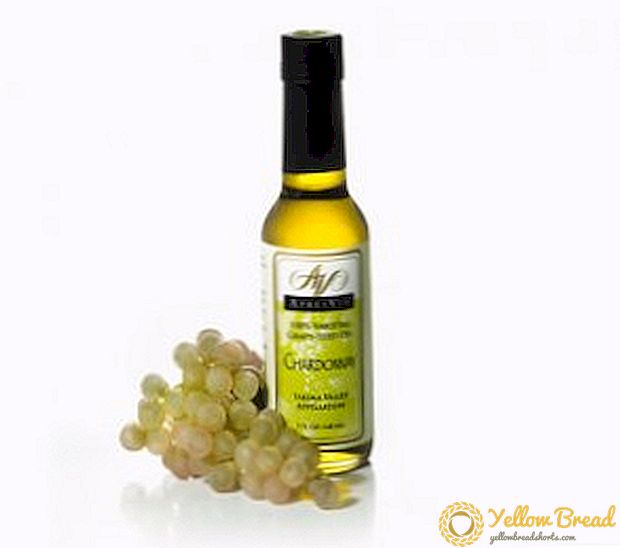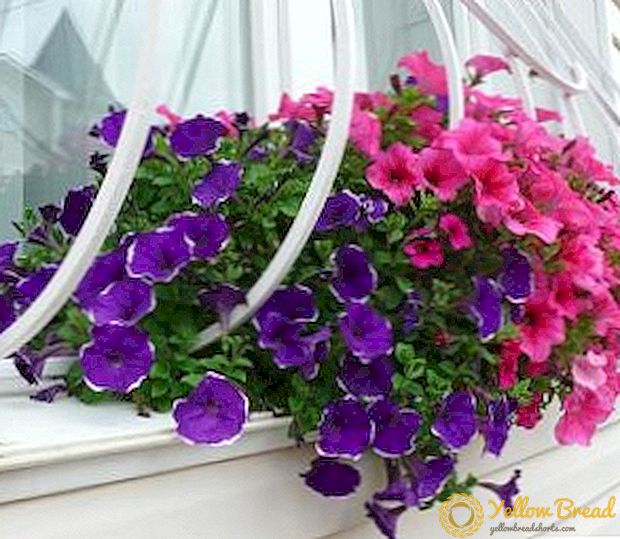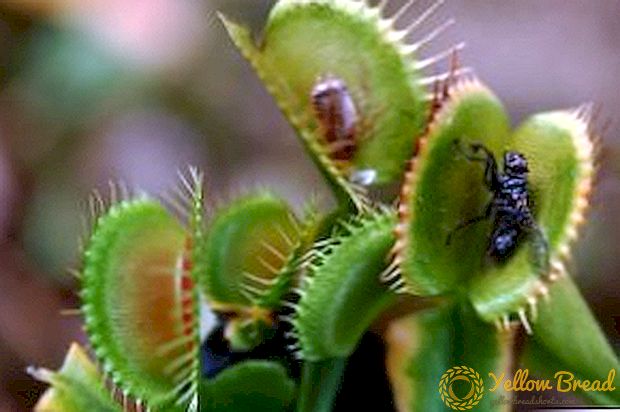 Azalea, or rhododendron - one of the most beautiful flowers, which is very popular among fans of indoor plants. The flower is especially appreciated for its bright, lush flowering that can bring the breath of spring at the height of the winter cold. This article is devoted to room azaleas: the rules of planting and caring for her at home, subject to which the plant will long please its owner with an amazing color and give a positive mood.
Azalea, or rhododendron - one of the most beautiful flowers, which is very popular among fans of indoor plants. The flower is especially appreciated for its bright, lush flowering that can bring the breath of spring at the height of the winter cold. This article is devoted to room azaleas: the rules of planting and caring for her at home, subject to which the plant will long please its owner with an amazing color and give a positive mood.
- Room azalea: description
- Where to place the azalea, the choice of location for the flower
- Choice of location and lighting
- What should be the temperature and humidity
- Features of room azalea planting
- What should be the soil for planting
- The choice of capacity for landing
- How to plant azalea
- Rules care for azalea at home
- Watering and feeding plants
- How to trim the azalea
- Pinching Azaleas
- How and when to perform an azalea transplant
- Major Azalea Diseases and Pests
- Room azalea breeding methods
- Little tricks: how to make the azalea bloom for a long time
Room azalea: description
Azalea (Latin Azalea) is a group of flowering plant species of the genus Rhododendron, of the Heather family. The homeland of the plant is the eastern countries of China and Japan, but sometimes it is found in the North American continent and in southern Europe. The name "azalea" comes from Greek and means "dry." They called it so because of the appearance, as it is usually a dry shrub of small size. Room azalea blooms at the age of 3 - 4 years. Most often, its flowers are bright pink, but there are also instances with white, saturated purple, lilac, red, or even two-tone flowers. Petals of flowers are even, slightly terry or terry. In nature, there are about 350 representatives of azaleas, of which only two are room.
 The most common type of homemade azalea is Indian. It is an evergreen, branched, dwarf shrub, whose height is about 50 cm. The leaves are small, dark green in color, on short petioles, covered with reddish hairs. The flowers are bright pink, reaching a diameter of 3 to 5 cm, bloom in winter.
The most common type of homemade azalea is Indian. It is an evergreen, branched, dwarf shrub, whose height is about 50 cm. The leaves are small, dark green in color, on short petioles, covered with reddish hairs. The flowers are bright pink, reaching a diameter of 3 to 5 cm, bloom in winter.
And the second kind - Japanese azalea, also an evergreen shrub, only slightly lower. Its main difference from the Indian azalea in flowers - they are much smaller. This type can be grown not only in the room, but also in the garden.
Where to place the azalea, the choice of location for the flower
It should be recognized that the azalea is a rather capricious plant, therefore, in order for it to enjoy its abundant flowering as long as possible, you need to try to find a comfortable place for it to be kept.
Choice of location and lighting
Azalea is a light-loving plant, but does not tolerate direct sunlight. Ideally placed on a glassed-in balcony or on a window sill that faces east, north or west. The main thing is to provide the plant with diffused light or partial shade.
What should be the temperature and humidity
The azalea flower needs special temperature conditions, which can complicate care at home, since the climate of living rooms is not always suitable. The most comfortable temperature for this flower is +15 ... +18 ° С. It is not easy to create such conditions in a living room, so it is better to place the azalea on a warmed balcony, an unheated corridor or in another cool place.
During the period of bud formation, it is recommended to lower the temperature to + 10 ... + 12 ° С. In summer, azalea should be protected from heat, so it is advisable to place it in an air-conditioned room to maintain the temperature within +18 ° C. In the hot, sultry air of a typical apartment or on a windowsill under a hot battery, the azalea will quickly die.

Optimum humidity for azaleas is just as important as temperature, so it will be difficult to care for her at home with dry air. Solving the problem of too high temperature can help Proper spraying or home humidifier. Azalea spraying should be fine and carried out with cool water. Can be placed around the plant containers with water for evaporation.
Features of room azalea planting
Room azaleas have their own characteristics of planting and further care, which must be observed in order to grow a healthy, luxuriantly flowering plant.
What should be the soil for planting
Azalea is one of the few indoor plants that grows on acidic soil. For cultivation, heather land or a mixture of peat and coniferous land in a ratio of 2: 1, with the addition of a small amount of sand, is well suited. In specialized stores, you can purchase a soil mixture intended for growing acidophilic plants (loving acidic soil).
The choice of capacity for landing
Azalea has a shallow root system, so a shallow pot should be chosen for planting so that the roots can be as close as possible to the ground surface.
How to plant azalea
 Before planting azalea at home, you need to prepare in advance pots with a drainage layer of broken brick or small pebbles. Then place the prepared soil in the tank and plant the azalea cuttings, deepening one and a half to two centimeters. If several cuttings are planted in one container, the distance between them should be 4–5 cm. After transplanting, the cuttings should be covered to provide them with a greenhouse effect and high humidity. At a temperature of +25 ° C and a humidity of at least 80%, azalea seedlings will form strong roots in two months.
Before planting azalea at home, you need to prepare in advance pots with a drainage layer of broken brick or small pebbles. Then place the prepared soil in the tank and plant the azalea cuttings, deepening one and a half to two centimeters. If several cuttings are planted in one container, the distance between them should be 4–5 cm. After transplanting, the cuttings should be covered to provide them with a greenhouse effect and high humidity. At a temperature of +25 ° C and a humidity of at least 80%, azalea seedlings will form strong roots in two months.
Rules care for azalea at home
Azalea requires comprehensive home care work that includes watering, feeding, pruning, pinching and transplanting.
Watering and feeding plants
Watering azaleas should be constant, you should not allow the soil to dry out. Water for irrigation is suitable only defended, soft and filtered, it is better if it is a little cool. If the soil is slightly dried, you can put the pot with azalea in a container with water for several hours. If azalea is grown in a greenhouse, then in winter it is recommended to lay ice or snow on the surface of the soil near the plant. It is undesirable to loosen the soil; the plant has thin, delicate roots that are on the surface and are easily damaged.
How to trim the azalea
 That the azalea beautifully blossomed, the plant needs to be cut in time. The purpose of such pruning is to form a volumetric crown and uniform buds. Pruning is carried out no later than March - April for the early varieties, and in May - June for the later ones. It is very important not to be late with pruning, otherwise the buds of flowers will not form on time and flowering will be weak. In azaleas form a crown of two types: in the form of a small tree or shrub. To form a tree, they choose one of the strongest branches in a small bush and grow a trunk from it; the rest of the shoots are cut.
That the azalea beautifully blossomed, the plant needs to be cut in time. The purpose of such pruning is to form a volumetric crown and uniform buds. Pruning is carried out no later than March - April for the early varieties, and in May - June for the later ones. It is very important not to be late with pruning, otherwise the buds of flowers will not form on time and flowering will be weak. In azaleas form a crown of two types: in the form of a small tree or shrub. To form a tree, they choose one of the strongest branches in a small bush and grow a trunk from it; the rest of the shoots are cut.
After the trunk grows, you need to pinch the tip. After that, the tree begins to branch, it will need to continue to periodically rotate and pinch the side branches to get a spherical crown. If you leave the shape of a bush, then the annual pruning comes down to shortening all the shoots of the previous one and removing unnecessary and weak shoots spoiling the shape of the bush.
Pinching Azaleas
After 2 - 2.5 months after the landing of young cuttings they pinch in order to activate the growth of new shoots. In this case, new flowers that could appear, are removed, as they inhibit the formation of new shoots. Repeated pinching is carried out after 3 months, cutting the plants to 4-6 shoots.For the formation of a bush of the correct form, the tops of the plant are pinched 10-12 cm from the ground, and the bush is turned and the side shoots are clamped so that the branches grow evenly.
How and when to perform an azalea transplant
Care activities, among other things, also provide for azalea transplantation, which is carried out annually at home. It is best to replant the plant in the winter after it blooms. Every year you need to transplant young plants, for adults will be enough once every two years. For transplant using shallow pots and a mixture of peat and pine land with the addition of sand. They do this very carefully, using the method of transshipment of land coma, since azaleas have very thin and delicate roots that can be easily damaged.
Major Azalea Diseases and Pests
 Azalea is often attacked by pests, such as azalea mole, greenhouse whitefly, mealybug and others. Azalea mole is a specific plant pest that damages leaves, which subsequently dry, crumble, and die. Adult pest caterpillars crawl onto healthy leaves, fold them into tubes and continue to grow there.
Azalea is often attacked by pests, such as azalea mole, greenhouse whitefly, mealybug and others. Azalea mole is a specific plant pest that damages leaves, which subsequently dry, crumble, and die. Adult pest caterpillars crawl onto healthy leaves, fold them into tubes and continue to grow there.
The greenhouse whitefly also harms azalea leaves; a soot fungus settles on its sugary secretions. In addition, the whitefly carries some viral diseases that are dangerous to flower crops. Strawberry mites cause great harm to azaleas, due to which the young leaves of the plant fold inward, instead of a pair of large, healthy buds, numerous small, unable to bloom. Plants slow down in growth and die over time.
Also azaleas are susceptible to many diseases such as powdery mildew, gray mold, rust, fusarium and others. Actellic or Aktara chemical preparations (1 g per 10 liters of water) as well as Plant Pin or Etisso help well against these diseases and pests, which stick into the ground at a distance of 2 cm from the stem.
Room azalea breeding methods
The azalea reproduces mainly by cutting. Cuttings about 9 cm long are cut from a healthy plant only once a year. Oblique sections are made at the very bottom, under the kidney. The lower leaflets of the cutting are removed, and the upper ones are cut in half. Then the cut cuttings are collected in bunches of 8 - 10 pieces and lowered for 8 - 10 hours in a growth stimulator.The cuttings are planted in shallow containers, in a previously prepared soil to a depth of 1.5-2 cm, and then covered to create a greenhouse effect.
Seedlings should be regularly ventilated, removing the film for some time. We must not allow drafts, the optimum temperature is +22 ° C. After the seedlings take root, the film is removed, the plants begin to regularly water and spray. When the shoots grow to 3 cm, it is time to plant them in separate pots.
Little tricks: how to make the azalea bloom for a long time
 There are several secrets of how to preserve an azalea, bought in a store, so that it will no longer delight the eye with its flowering and will not die after the petals fall. For this, after flowering, you need to remove the plant from the pot and place it in a container with cold water to wash the roots of the earthen mixture in which it grew, and remove the dead roots. Then the root system should be rinsed in a solution of manganese and plant the plant in a special soil mixture for azaleas. In about a week, the azalea will give new leaflets, it will come to life and will long be happy with its spectacular flowering.
There are several secrets of how to preserve an azalea, bought in a store, so that it will no longer delight the eye with its flowering and will not die after the petals fall. For this, after flowering, you need to remove the plant from the pot and place it in a container with cold water to wash the roots of the earthen mixture in which it grew, and remove the dead roots. Then the root system should be rinsed in a solution of manganese and plant the plant in a special soil mixture for azaleas. In about a week, the azalea will give new leaflets, it will come to life and will long be happy with its spectacular flowering.






